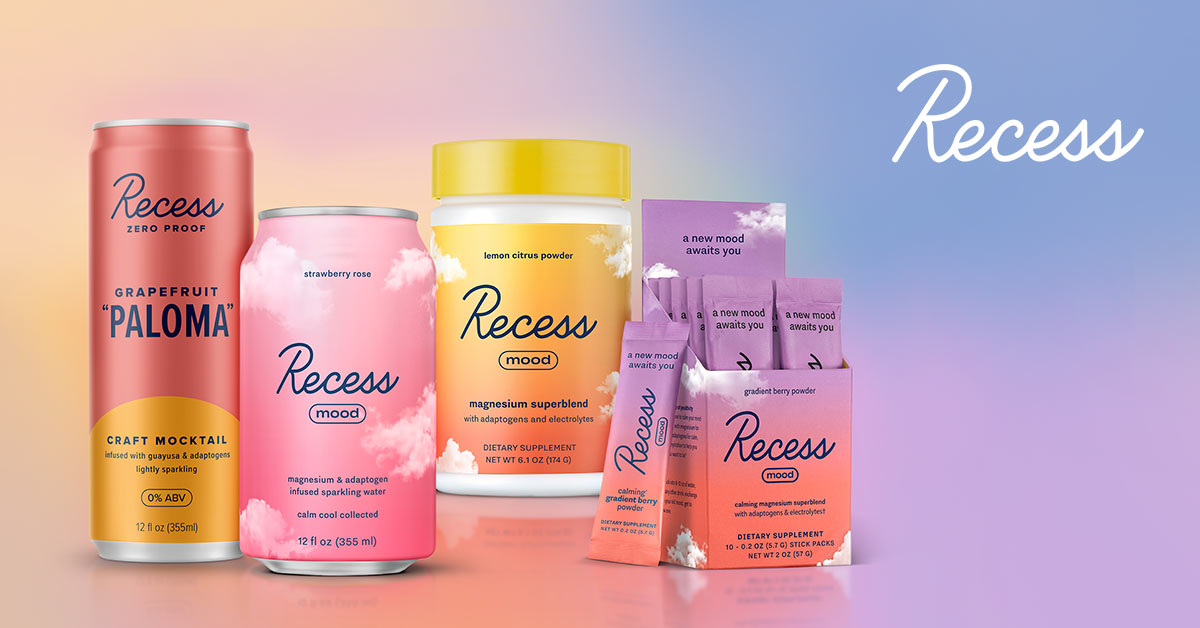Recess’ move to the mainstream is big on Mood.
On Wednesday, the relaxation platform brand announced its largest expansion into conventional retail to-date, bringing its non-CBD Mood line, new Mocktail offerings and Mood stick packs to 5,000 new doors across the country, including national grocers like Target, Albertsons, CVS, H-E-B, Sprouts and Winn Dixie.
According to founder and CEO Ben Witte, the national roll out into conventional retail is a testament to the “unique” business model that he believes “is very much beginning to work.” The company launched Mood in 2021 as a way to keep building the Recess brand while the industry continued, and still continues, to await federal guidance on CBD consumption.
“Our strategy has been to go broader than any beverage company traditionally would at our stage, but our view is that this was a unique situation where becoming a platform early made sense and was a requirement because of the dynamics of CBD,” said Witte.
Though many national retailers remain hesitant to bring in any CBD beverages, Mood, and now Mocktails, represent the present and future of the brand’s relaxation platform ambitions.
According to Witte, these two lines now account for nearly 75% of the company’s business with Mood contributing the majority of sales. Mood is distributed via a mix of DSD partners – Columbia Distributing in the Pacific Northwest, Scout in Los Angeles, Atlanta Beverage Company and Big Geyser in New York City, to name a few – and broadline carriers and has performed particularly well in Target, H-E-B, Albertsons/Safeway stores, Witte said, where it is merchandised in the functional beverage set alongside probiotic sodas and other nootropic-infused drinks for between $2.99 to $3.49 depending on the retailer.
Recess’ CBD beverages continue to be sold through a network of independent and regional grocers but account for less than a quarter of the company’s sales. On shelf, a CBD-infused Recess costs between $3.99 to $4.99, depending on the retailer, a price point that has remained consistent, said Witte. Due to the uncertain regulatory environment, Witte said the company is primarily focused on scaling Mood and Mocktails. Non-CBD relaxation beverage space presents a larger, unrestrained distribution opportunity for Recess, but the market opportunity is expanding at only a slightly faster pace than CBD. In 2021, CBD beverages rang in $245 million in sales, while relaxation beverages notched $301 million in 2022.
In addition to capturing space in national grocer, Recess is also looking to bring its Mocktails “anywhere alcohol is served” – starting with The University of Southern California and a new deal that will make Recess’ mocktail line the Official Mocktail of the USC Trojans. Following the Mocktail launch, the line has soaked up nearly half of Recess’ e-commerce business and Witte claims it “immediately” jumped to the number one mocktail on Amazon.
Building a broad-reaching business within an emerging category – inclusive of three distinct product lines, numerous formats, and only slightly nuanced value propositions, after only half a decade on the market – sounds like a risky move on paper. However, Witte doesn’t believe Recess should be following the playbook: “creating a new category or a new space is a fundamentally different exercise than going into an existing category and trying to capture market share,” he stated.
The broad approach is also reflected in how the company has positioned Recess as a brand – all the way down to details like its social media handles and website URL. The line “Take a Recess” rather than “Drink Recess” was a subtle, yet intentional decision that Witte said has guided the business toward building a platform rather than just another hemp-derived or adaptogen-powered drink brand.
“When you look at some of the probiotic soda drinks, there’s not really a platform or really multiple categories for an Olipop or Poppi to extend into like there would be for us,” said Witte. “I think we’ve recognized what made the opportunity unique and pursued a unique business model that, I think, is very much beginning to work.”
Witte sees platform brands as the way of the future and has been preaching the idea and pursuing the approach since launching Mood two years ago, though he claims it has been on his mind since Recess was founded. He cited moves by large beverage businesses over recent years as proof, such as Coca Cola, highlighting how the company offloaded Zico and Honest Tea, bought Topo Chico and subsequently platformed the brand out by expanding into numerous new product categories.
Despite the small share Recess’ original CBD products currently hold within the business, Witte said the company is fully committed to building a platform inclusive of those products. He believes the day of federal regulation will eventually come and when it does, there will be a dedicated CBD beverage set in retail that is distinct from the functional beverage space. By then, consumers may see Recess playing in categories beyond just the beverage realm.
“We think the success of each product line drives the success of the other so it’s not an experiment like we are very much doubling down on a platform strategy,” said Witte “Our view is that there’s a better for you relaxation product space emerging that’s going to that’s comprised of multiple subcategories within it and there’s a big opportunity for there to be a single platform brand that drives it.”
